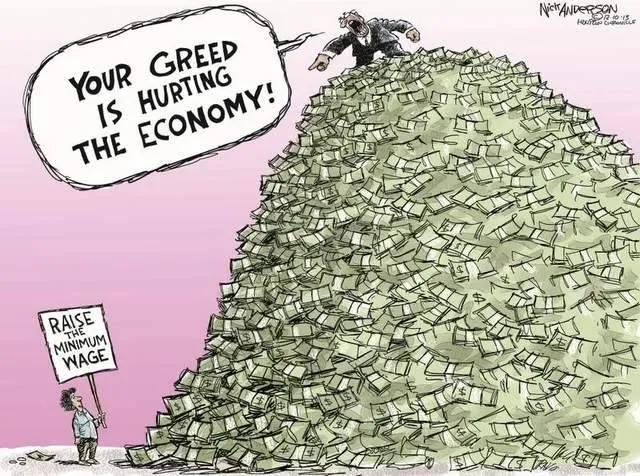Capitalism-Wealth and Poverty

Image Source(thedailyblog.co.nz/wp-content/uploads/2014/01/greed.jpg)
Giving
Through Wealth and Poverty Chapter 3, one can understand the importance of giving and its contribution to capitalism. Before a time with currency and money as a service of exchange, the world exchanged through giving and receiving. It is from giving and receiving that capitalism was founded. According to Gilder, it is risking, creating, and most importantly giving that addresses the role of the capitalist. Adam Smith attributes capitalism similarly, but with emphasis on self interest. When individuals give with their own self interest in mind, the invisible hand will direct the market and the economy in positive ways. This is all in the best interest for the economy as a whole. When people work in their own self interest, their actions become more predictable, this allows for the invisible hand to create a more predictable economic system. Individuals must give before receiving, while it is important to work with your best interest in mind, I believe it allows for the possibility of greed. Therefore, I agree that the attribution of capitalism is to giving.
“In explaining the extraordinary production of capitalism, however, the anthropology of the potlatch impels us to focus not on the exchange mechanism(the market) but on the prior gifts and its creation”( Gilder, pg 31, 1981).
The idea of the sympathetic giver helps further understand rewards pertaining to receiving gifts. Frank Knight presents the idea that Capitalism rewards those who are sympathetic givers, and punishes those who are not. What I believe he is explaining here is that people who give large amounts, also receive large amounts, and vice versa. Through this I was able to see the relation to the market and our economy. People who contribute little to the community and their work typically do not attain wealth, but instead face losses. On the contrary, sympathetic entrepreneurs, who contribute large amounts to their economy, usually receive large amounts of rewards for their giving. One explanation for this difference in contribution is greed.
Greed
Greed is a defining issue that prevents individuals from taking risk, and receiving profit. It is my understanding that people who expect rewards but do not give demonstrate greed. While everyone is somewhat driven by greed, it can not be the primary driver in a capitalist society. This I believe is a common issue in today's society. Only after giving a gift, can someone expect something in return. Entrepreneurs are successful because of their genuine self sacrifice.Greed in different ways, contributes to capitalism and is constantly seen through exchange. However, Capitalism does not stem from greed.
Risk
Through Gilder's discussion on risk we can see his view of capitalism and its vital importance in the system of the economy. His basic argument I believe is that capitalism is set up to handle risk, as the future is unpredictable. He attributes this to giving. Socialism, on the contrary, is based on the idea that we know enough to predict the future of the economy. By focusing on individual wants and needs, the economy balances itself out. This essence is the work of the invisible hand.
Through this understanding of capitalism and risk, I began to understand his attribution to entrepreneurs. Entrepreneurs are willing to take risks to achieve what they want to attain. They know that the future is uncertain, yet develop something new, with no promise that it will succeed. Entrepreneurs are successful through their giving. They willingly make sacrifices that in return, gift products, employment, and services to the economy.
“A young man proves himself capable of becoming a mumi by working harder than everyone else and by carefully restricting his own consumption of meat and coconuts” (Gilder, pg. 29, 1981).
Self Sacrifice
Capitalism does not work to be fair, it works to be just. Because the U.S economy was built on capitalism, it rewards those who work hard and make sacrifices. In today's society, there are many options that reward people for attributing little to the economy, this has led to an imbalance of the rich and poor. I believe Gilder's warning through this section of his writing is that once people receive compensation that was not worked for, the compensation loses its value and relation to hard work. Why would the unemployed want to become employed if they are receiving compensation through no work?
As changes in the economy continue to unfold, it is important to remember that it started with giving. Entrepreneurs are successful because they give to the economy through services and goods. I believe the world has become more filled with greed. One can see this through the increase in taking, and decrease in giving. Capitalism assumes that people act on greed, self sacrifice, and self interest. Through both Adam Smiths and Gilders works, one can understand the problem of pushing for an economy that does not reward those who give or act in best self interest. Individuals who lack self interest and avoid self sacrifice ultimately receive less gifts, as they contribute less to the economy.
References
Gilder, G. F. (2012). Chapter Three: The Returns of Giving. In Wealth and poverty (pp. 27–49). essay, Regnery Publishing, Inc.
Sowell, T. (2015). Wealth, poverty and politics: an international perspective. New York, Basic Books.